“Creating a small 'tributary' within the context of fashion”
Edit&Text by Yukihisa Takei(HONEYEE.COM)
Photo by Kiyotaka Hatanaka
Movie Directed by Ryoji Kamiyama
Every time I see the clothes of the brand meanswhile, I often have to think 'How does he come up with a design like this?’. Each item is authentic but never ordinary. There is always something functional and witty about their items. Although they sometimes offer designs that have never been seen before, the brand concept is that "as long as it is everyday wear, clothes are tools, not costumes". HONEYEE.COM caught up with the meanswhile's designer, Naohiro Fujisaki, to find out more about his intentions.
"As long as everyday wear, clothes are just tools, not costumes."

A residential area near Komazawa Park, Tokyo, tucked away in an intricate alleyway that is particular to Setagaya. meanswhile, the brand won the TOKYO FASHION AWARD 2020, has its store in this hidden location, far from the heart of the city. The store opens only from Friday to Sunday. There is also designer Naohiro Fujisaki's design atelier located here. When the crew arrived, he opened the shutter and showed up for the interview, carefully choosing his words and started speaking politely.
- Why did you set up the store in this hidden location?
Naohiro Fujisaki (F): I used to live around here, so this space was initially used as an office and warehouse, but then I renovated it a bit and turned it into a flagship store. This is a place where people who know about us would visit. Even if I were to open another store in the future, I would make one close to where I live rather than in the city centre.
- meanswhile is a unique fashion brand that states that "clothes are tools, not costumes". Have you always had this thought?
F: That only applies when clothes are "as long as everyday wear", but there are quite a lot of things associated with it. When I was a student, I made some hand-sewing wading dresses, but that's where I experienced how to make 'costumes’ like clothes making. On the other hand, I also liked the functional aspects of sportswear and outdoor wear, so when I launched my own brand, I wanted to create something that was based on both of these concepts.
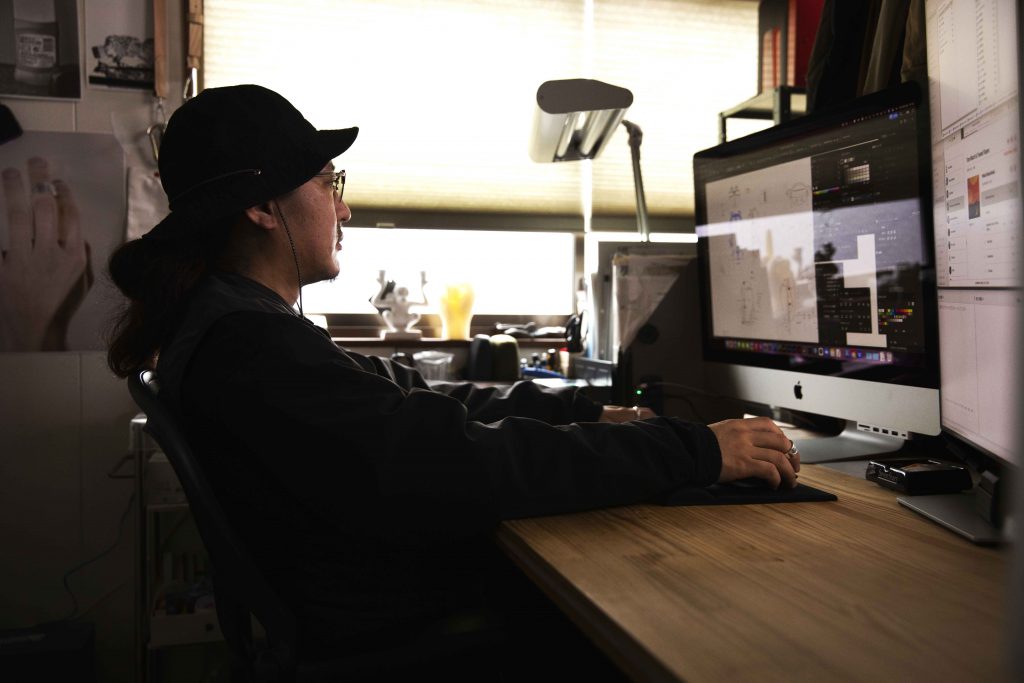
- In that context, was there a sense of rebellion against 'costumes' such as wedding dresses?
F: No, it's not that, it's just when I think about the fashion industry and the market, I think that 'costume' is a big part of the reason why fashion is now being a declining industry.
- What do you mean by that?
F: I feel people have come to see fashion as "something empty" as a result of a long history of marketing or business models that create trends and put an 'expiry date' on clothes. But rather than that way, I wanted to offer clothing as daily necessities and tools that can be the same as "food, clothing and shelter", and to do this in the fashion market.

- I get the idea. I am also a type of person who wears clothes for a long time, but when people say to me, “I haven’t seen it for long", I get mixed feelings as if they are saying, "You are wearing something outdated".
F: Just out of curiosity, what kind of clothes do you buy?
- Something that I can expect to wear for a long time even if the design has a strong seasonality. I have some JUNYA WATANABE MAN clothes that I've been wearing for 20 years (laughs).
F: Wow, that’s amazing.
Fashion exists in indirect functionality
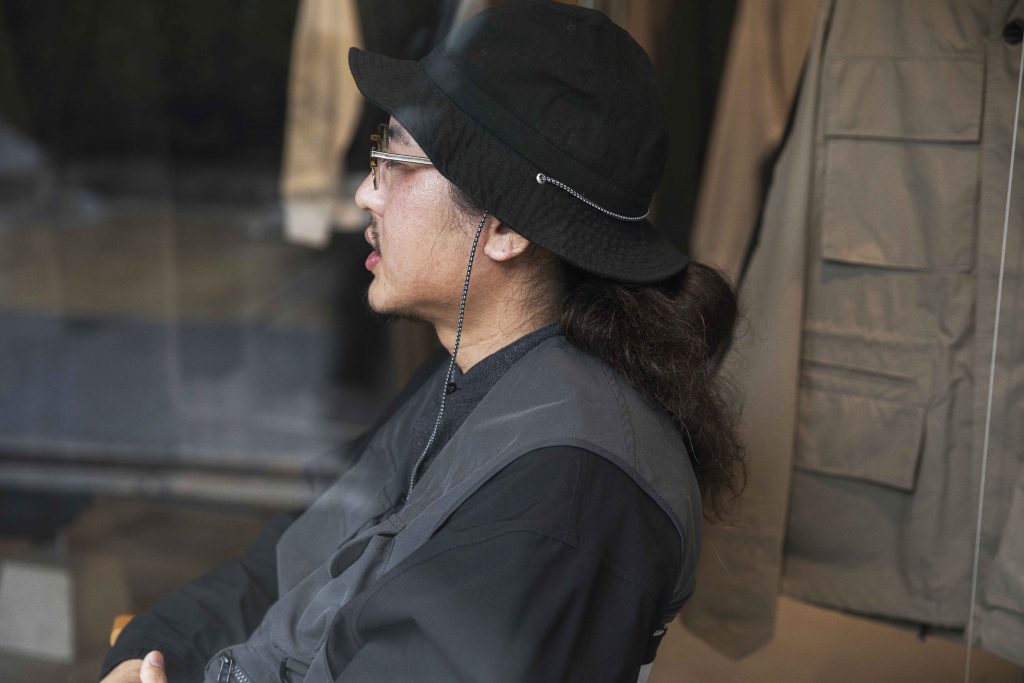
- In that sense, has meanswhile always been about making things on the premise that they can be worn for a long time?
F: It's part of both, I want to push myself to find out about clothes as tools and products, but I also want to challenge in the fashion market.
- Does that mean there is a certain contradiction?
F: Of course, we want to offer functional products, but we are more focused on putting forward the philosophy and values of the brand. In some ways, we try to show functionality that is different from outdoor clothing.
- Are there any specific examples of this as a product?
F: For the Fall / Winter 2022, we are working on a new item that has a windbreaker tucked into the hem of a fleece jacket so that when you take it out, you can wear it over the jacket. The fleece is warm but not enough to protect against the wind. It's a simple idea to put a windbreaker over it, but it’s easier to just use windproof fleece material now. I believe that taking a long way and making a detour is “design". The idea is that fashion exists in indirect functionality.
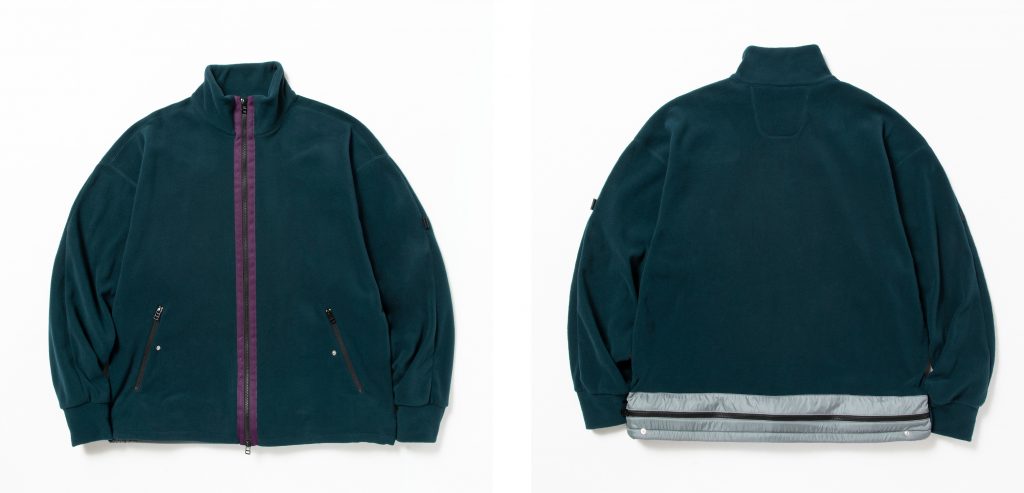

- When I saw this at the exhibition, I thought this was an 'invention'. How do you come up with this kind of idea?
F: It’s just a matter of choosing the straight path towards the goals, or make a detour. I know that there are millions ways to do that, so I take a moment to pause at the point where most people think, "This is the best way to express this function”, and explore various paths. Although the goals to reach will be the same as others after all, this way of how I think about things has become my routine, so I think I can pull out different ideas than other people.
Ideas coming from the natural order

- You also go camping a lot, but do you gain anything from there?
F: I was born and grew up in the countryside and I like nature. My father is an artist, and when I chose this path to be a designer, he told me only one thing: "Try to see nature". He told me that I should observe and learn from nature because nature has its own form and everything has its own reason.
- What sort of ideas do you get from looking at nature?
F: For example, asking myself "Why is this tree shaped like this?”. If you accumulate such things on a daily basis, it often helps with opening up versatile ideas when designing. The way things are formed in nature somehow comes alive in design.
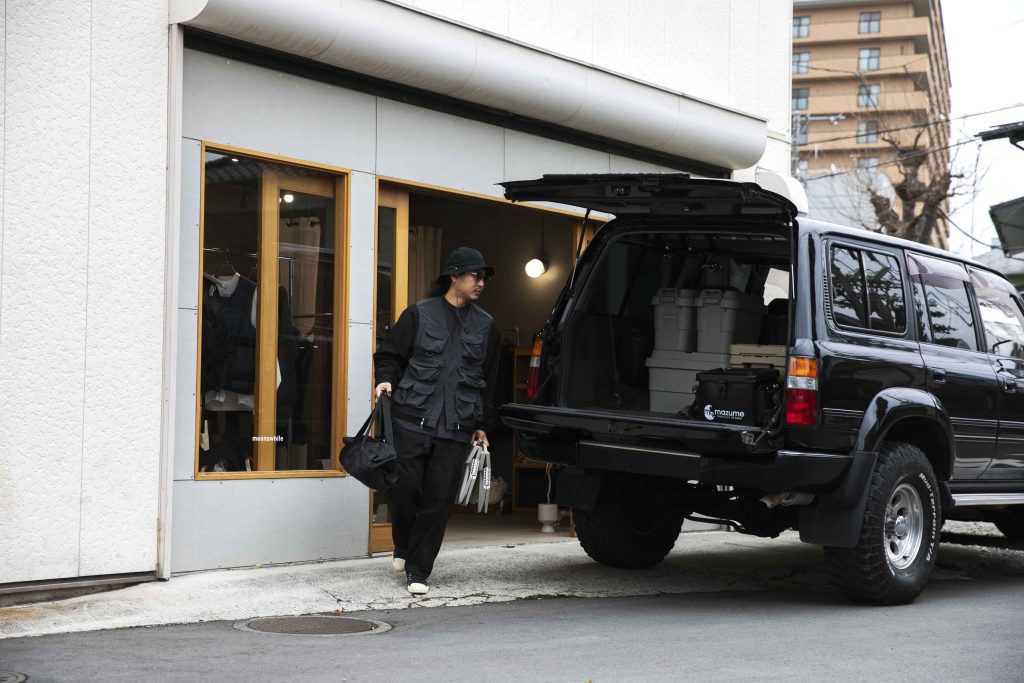
- Is there something specific that has become a product of that too?
F: I had previously collaborated with an ‘air-cooled clothing' company, and the fact that wearing clothes in layers when it's hot was interesting. I thought that such a situation is similar to a rainy day in summer when people wear rainwear, so I came up with the idea of making rainwear with air-conditioned clothing. However, if you put a fan on the outer side, it would absorb rain, but then I designed it to avoid that, so I felt I had 'invented' it.
- Collaborating with "air-conditioned clothing” company is something very unexpected, but this is also such an inventive idea.
F: Well, I'm aware that I'm making quite a niche products, including this one (laughs). But I think we are making something that wins the hearts and minds of one customer in a hundred, or one in a thousand. And I think that's actually quite a lot of people, considering at a global scale, not just in Japan.


Creating a small 'tributary' within the context of fashion
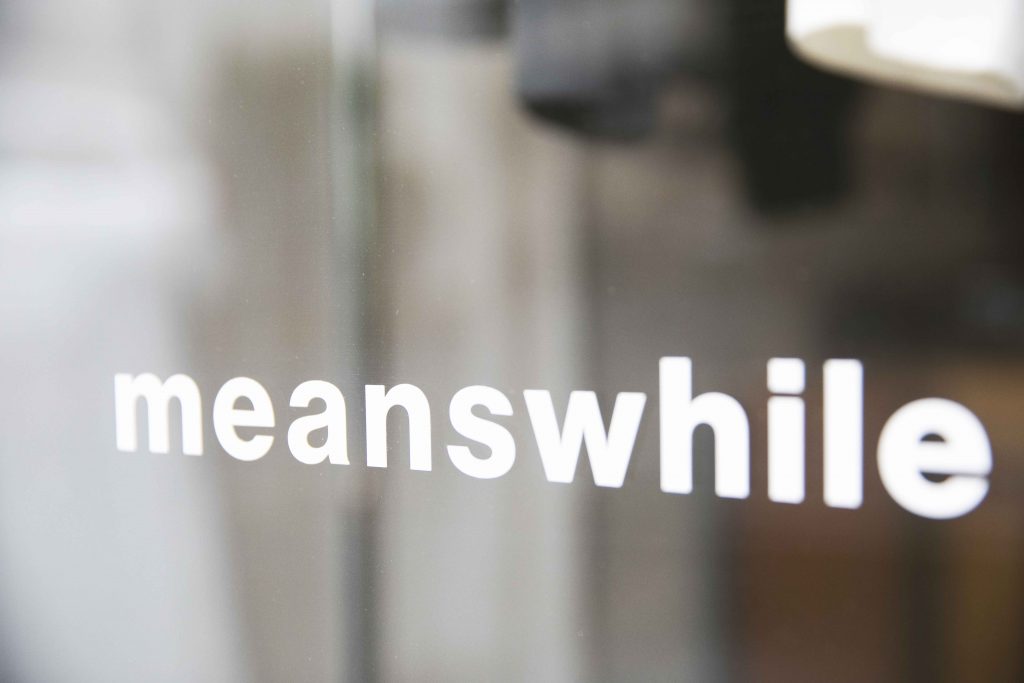
- How is the current customer’s reaction to meanswhile from overseas?
F: The volume of sales now coming from overseas is actually increasing, which is great.
- What does the brand name ‘meanswhile’ stand for?
F: The intention is to be a brand that is on a different side from the mainline of things. But it can't be explained in a single word, so it hasn't really penetrated much (laughs).
- But after you share your thoughts on the design approach, it makes sense. You've mentioned that you want to make fashion and functionality work together. What do you think the future of fashion should be like?
F: I had already come to one conclusion when I started the brand, that the problems facing the fashion industry today were so deep-rooted that there was nothing I could do on my own, so I had to give up. If that is the flow of a big mainstream river, I want to create a new tributary, even if it is small and narrow. This is also reflected in the brand name meanswhie.
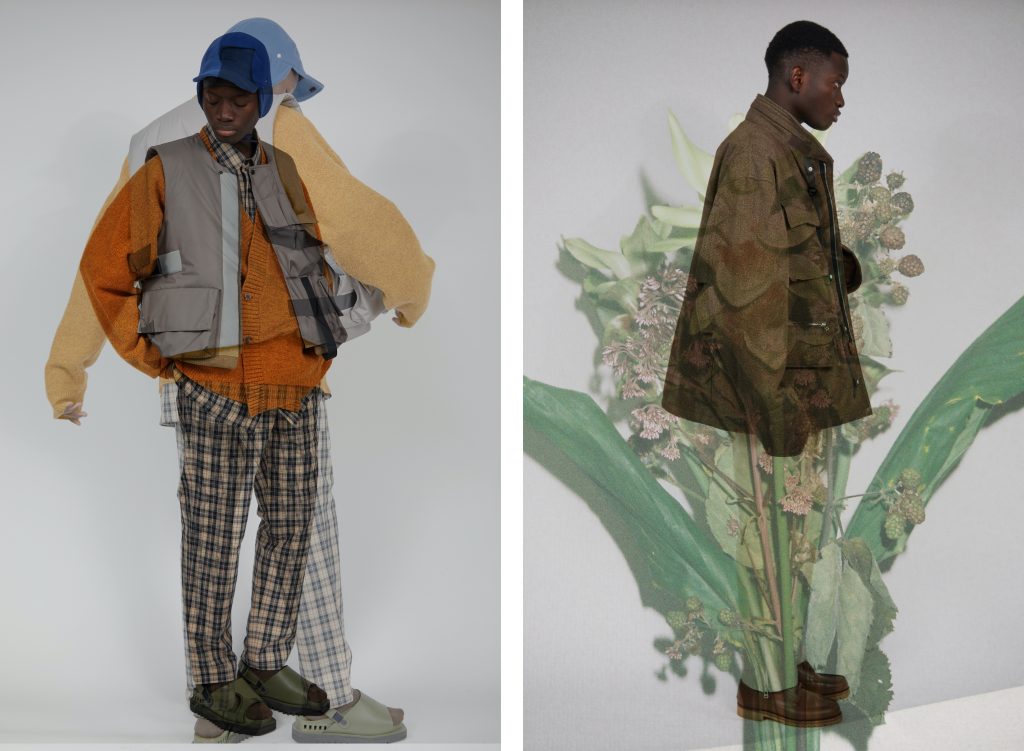

- That explains. The brand name itself also implies ‘tributary'.
F: There is something that can be conveyed when I talk like this, so it makes me think that I have to push myself to be more upfront (laughs).

- By the way, did winning the Tokyo Fashion Award 2020 give you any confidence?
F: Yes, I think so. It gave me a certain confidence. But I mean, I was going to anyway when I started the brand, so it was more like confirming that things were going well, and also putting pressure on me at the same time.
- What do you have in mind for the next stage?
F: I want to challenge the LVMH Prize and other fashion awards.
- But you have to do runway shows for those awards. The last show you did in Tokyo was wonderful, but how are you going to face that?
F: Having experienced a show once and knowing how hard and exciting it is, I would love to do it again, but I don't set a goal just to do a show. I will do it when the right time comes and when I need to.

Naohiro Fujisaki
Fashion designer
Born in 1986. After graduating from fashion college, he gained experience at two apparel companies before launching meanswhile in the A/W 2014 season. With the concept of "As long as everyday wear, clothes are just tools, not costumes", the brand creates products that pursue the functionality in the surface and nonsense aspects of fashion. In 2016, the brand won the highest award in the Tokyo Fashion Awards' New Designer Fashion Grand Prix, Professional Category, also won the TOKYO FASHION AWARD 2020 in 2019.
[Editor’s note]
Every time I see the products from meanswhile at their exhibitions, I wanted to ask him how these designs come up. Having had a long talk with the designer, Fujisaki-san, this time, I was able to ask him about the thoughts behind the brand name and his creative process. And the more I talked to him, the more the clothes began to have a strong pull. (Takei)